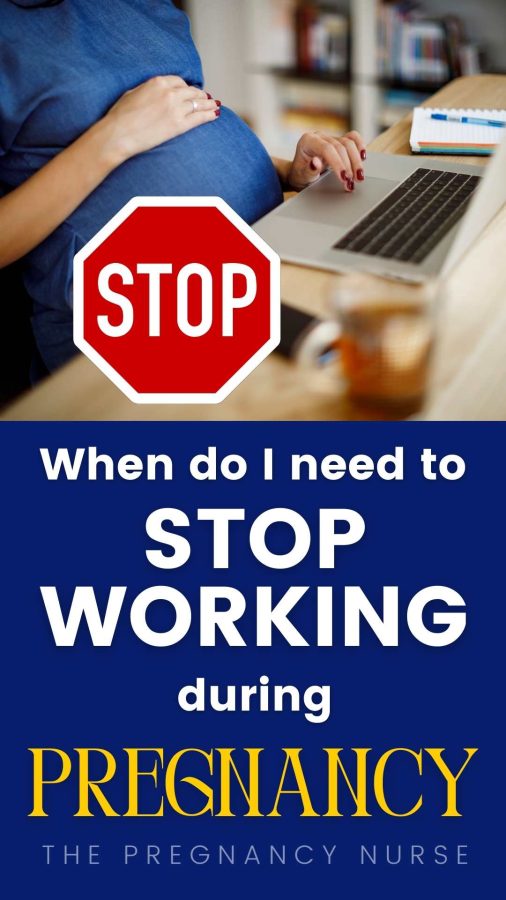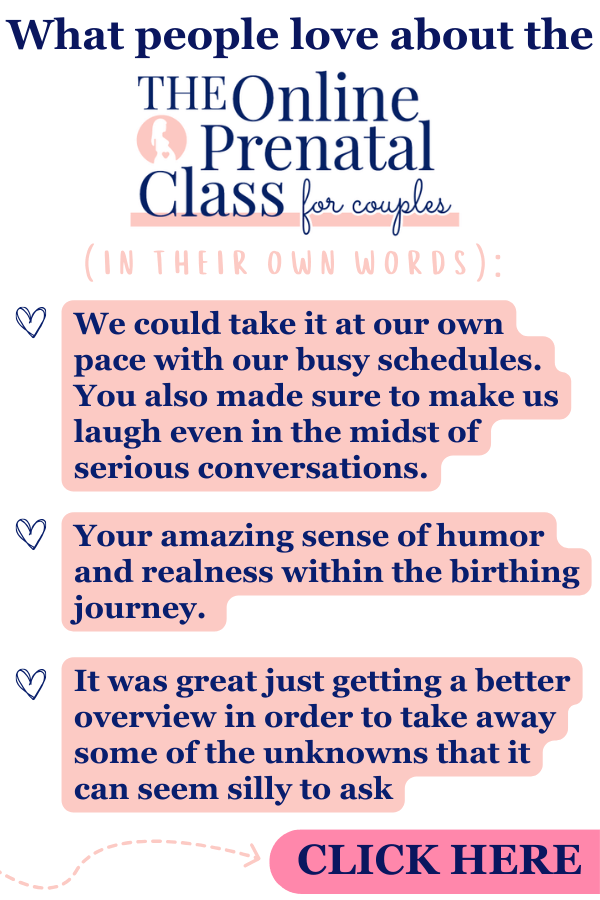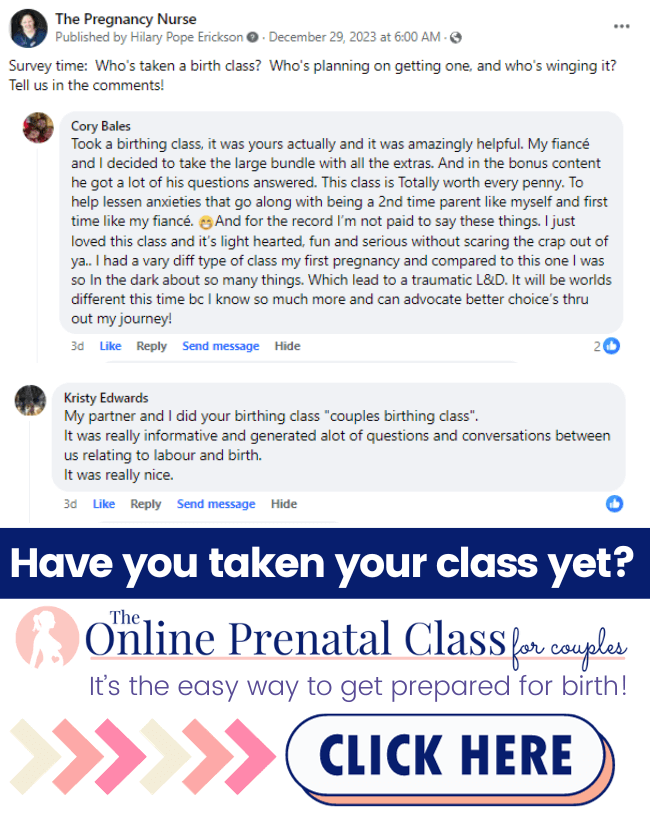👋 I’m so glad YOU are here. Are you looking to also get your partner prepared? This is for BOTH of you. Couples just love it and I know you want to both feel prepared!
Working during pregnancy is hard. Obviously, you may enjoy your job, but you might also be feeling too stressed with the changes in your body, plus getting ready for baby. When should a pregnant woman stop working before baby arrives? Let’s find out!

I also have a video on this same topic:
Just a reminder that I struggled with this with EACH of my pregnancies. There is a LOT to balance, and I feel your pain. Let’s talk about some thing to consider:
Why work during pregnancy?
There are a LOT of reasons to work during your pregnancy:
- You enjoy your job
- You enjoy contributing to either your family or society
- You need the money
- You need the benefits
- It takes your mind off of pregnancy
I know that working during pregnancy gets a real bad rap — mostly because the women are pregnant and bone-tired. That being said, working to save extra money before baby, and contribute are big factors to stay working.
I actually worked on my first pregnancy right up until I had my baby 2 days after my due date. It kept me busy, and I wasn’t freaking out about when the baby would come and how miserable I was — so I honestly think that helps — especially on first babies. But every person is different, so let’s talk about considerations to STOP working.
Oh, and grab my free hospital packing list to get that prepared too:
7 Signs To Stop Working During Pregnancy?
High blood pressure
High blood pressure CAN be a sign that you’re under too much stress.
It can also be a sign of preeclampsia or PIH. It can also be hereditary, and they can give you medications to bring it down.
You’ll want to talk with your provider about which one it is for you — but blood pressure is definitely an indication you may need to stop working.
Want to know more info on pregnancy complications — check out these posts:
- Pitocin to Induce Labor
- Pregnancy & Labor Statistics: Be Informed What Is Normal
- What to Do When You’re Having Contractions
- To the Mom Who Thinks She’ll Go Early.
- You Failed Your 1-hour Glucose Test – What’s Next?
Your work required tasks are more than you can do
Depending on your job, you may actually not be able to do the things your work requires.
Some jobs can put you on “light duty” but some may not have that option.
Things in this might be:
- Heavy lifting
- Bending over frequently
- Standing up for long periods
That being said, if this is your issue — since your condition is temporary, it is a good idea to talk with your boss about your concerns. They may have something they can shift you to for a short period before the baby is born.
The need for the money no longer outweighs how hard it is to work
The reality is that most people work for the money.
If the money is no longer worth it, the you quit.
But, if the need for money is worth how hard it is — then you keep working. It’s really that simple. Sadly.
Extreme stress or pain at work
If your job environment is extremely stressful, or you have a lot of extreme pain — you’ll want to either shifting your responsibilites or taking a leave. It isn’t good for the baby to experience long-term stress, and extreme pain isn’t good either.
For both of them, I’d recommend talking to someone:
- Maybe someone in HR if your job is really stressful
- Maybe ask for a consult with physical therapy if you’re in a lot of pain — see if they can help.
Your Doctor Says to
At some point, your care provider may say it’s time to stop working. Of course, you’ll want to find-out why and if you agree with that statement — but most doctors understand your need for income vs what is going on with your body.
Sometimes it’s due to the reasons above, sometimes it’s due to an issue with the baby or your body, or just an issue with ah high-risk pregnancy (although it really varies due to the reason it’s high risk — so don’t plan on something once you get that “label”) So, be sure to understand it before you go out on leave.
Remember that sometimes you’re able to return to your job after a week or so of bed rest, but sometimes it’s just taken week by week — so be sure to communicate that with your employer.
You go into labor
At some point your body will go into labor. Go home. Don’t have your baby at work.
If you’re early, you may be able to just take a few days off for preterm labor precautions, but if you’re close to your due date you may need to just be done.
Want to know more about signs of labor — check out these posts:
- Does Evening Primrose Oil Induce Labor?
- Hospital Policies You Can NOT Say No To.
- How to Push-Out a Baby
- What a Birth Plan Can ACTUALLY Do For Your Birth?
- What do People Wish They Had Known About Before Birth?
Your Maternity Leave Benefit is Due
Some places allow for maternity leave to start a certain # of weeks before baby is born. These weeks may or may not be in addition to the time you get after baby is born. If you get a certain number of weeks before baby, I would say that most women leave at that point. They’re tired and ready to rest their tired legs and feet at that point.
Can you work while you’re pregnant?
Yes, in most cases, you can continue working while you’re pregnant, but you may need to make some adjustments to your work environment and schedule as your due date approaches. Some women take maternity leave before their baby is born, while others wait until after the baby is born to start their maternity leave.
If your work is a place where pregnancy wouldn’t be appropriate, be sure to talk with your employer early, and possibly even before getting pregnant.
Either way, it’s important to take time to rest and take care of yourself during pregnancy. If your work is physically demanding or involves heavy lifting, you may need to talk to your healthcare provider about changing your job duties. You may also be able to work from home or adjust your work environment to make it more comfortable for you.
Like I said — I struggled with this with each of my pregnancies. On my first we couldn’t afford me to go off early, so my work shifted my responsibilities my last few weeks (I worked at a nursing home at that time) and it helped. I worked past my due date because it was important to keep earning the cash til’ baby came.
I will say that if you’re thinking about going off of work, it’s a GREAT time to get that birth class in. I recommend this one.
When is the best time to start my maternity leave?
There is no definitive answer to this question as it depends on a variety of factors. Many sleepless hours are spent over this issue.
Women really vary into when they take their maternity leave. Working as a nurse, I wouldn’t say the majority did one thing or another.
Ultimately, it is up to the individual woman to decide when the best time to start her maternity leave is. However, it is important to keep in mind that many employers have specific policies regarding when maternity leave can begin, so it is wise to consult with one’s HR department before making any decisions.
Maternity leave considerations
The first question is if you need that income you are making at that job. If not, then your answer is a lot more simple.
The next questions involve:
- How long of a maternity leave can you take (some only give you 12 weeks total, so if you go out at 38 weeks — you have to be back 12 weeks later — no matter when baby is born)
- If you have disability or some insurance that will help pay your salary while you’re gone
- If you don’t have disability, how long can you live without a paycheck.
Many women find that they’d much rather work longer during pregnancy, and be home longer with baby — but it will vary depending on each person’s circumstances.
Please note that often times maternity leave policies are flexible. Maybe you could adjust to part time at 38 weeks, and then go back part time 12 weeks after that, or something. Be creative, and see if your work will let you adjust.
BTW, if you’re close enough to consider leaving work — grab my kick counts cheat sheet so you’re making sure that baby is moving well whether you’re at work or at home:
How to stay comfortable at work during pregnancy
I have 4 tips to staying comfortable at work:
- Make sure to take breaks every hour. If you’re standing constantly, try to sit for a bit with your feet up every hour. Vice versa, if you’re sitting, stand-up every hour (easy, since you may need to pee)
- Stay hydrated. Keep a water nearby you at work so that you can drink a lot during the day. It will help you stay more safe and comfortable. If your employer doesn’t like you having water with you, explain that helps you have a healthy pregnancy
- Consider at home work? Can you work from home more? That gives you the option to work with your feet up more, or put in laundry between tasks. It just allows that movement more freely.
- Stay in touch. Hopefully you have a good manager who you can be honest with how things are going. It doesn’t do anyone a favor for you to abandon them right when they need you, so the more information you can share the better it will be for both of you.
Your rights at work while you’re pregnant
This REALLY varies state to state, and company to company. Some states have a paid maternity leave starting at 36 weeks.
Some companies have very flexible leave policies, some do not.
That being said, talk with HR about your rights. They should be very aware with FMLA and if it applies to you (you have to work a certain # of hours and for a certain length at a company for it to apply).
Please do be aware that not all companies provide maternity leave, and not all give sick days, so it will be up to you to figure-out how to fund your maternity leave if they are not going to.
I have worked in Utah that provided me no protections, and I had to parcel out my sick days to pay for my insurance, and I worked in California where I had paid leave from 36 weeks on, and for 12 weeks after baby is born. So, where you live REALLY does matter.
What to do when you’re off work?
This is your time to relax and get ready. Take this time to plan, bond with your baby and get your home and life ready to add a baby to it.
Some ideas:
- Get the nursery ready
- Wash baby clothes
- Get the car seat or stroller ready
- Journal about your pregnancy and hopes and dreams
Maternity leave and working during your pregnancy has become a touchy subject anymore. I know that in the US women demand better maternity leave, which is why I’d recommend you check it out when you’re interviewing for a job. Some companies are very liberal, and some are not — and it may play into which job you want to accept.
Another thing to do is to make sure to get prepared for birth. The Online Prenatal Class for Couples is the easy way to get prepared! Couples report, on average, feeling more than 50% less anxious about their birth after the class!
And, if you’re not quite sure you’re ready for that whole thing, check out my free prenatal class. It’s your first step toward getting in the driver’s seat of your birth.









 What Are the BEST Online Childbirth Classes for First Time Parents?
What Are the BEST Online Childbirth Classes for First Time Parents?
